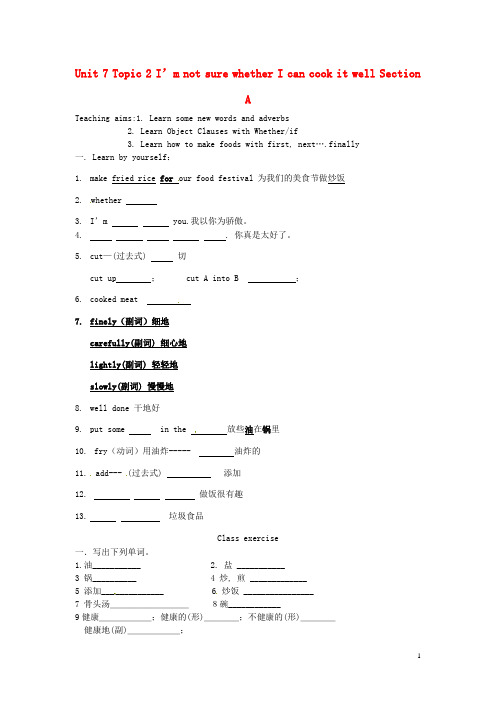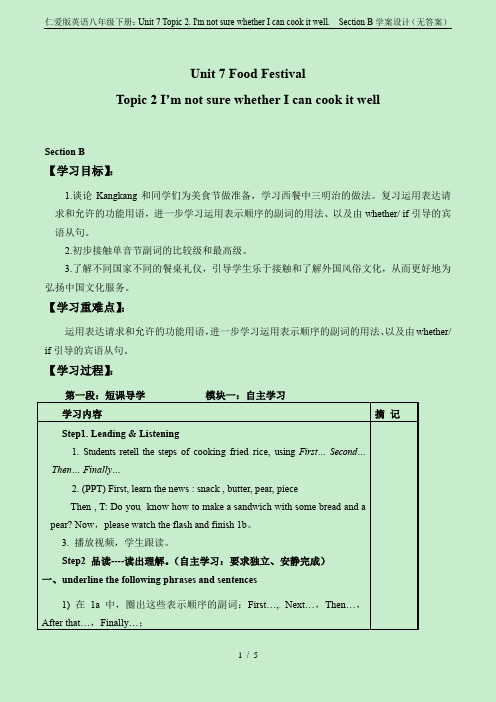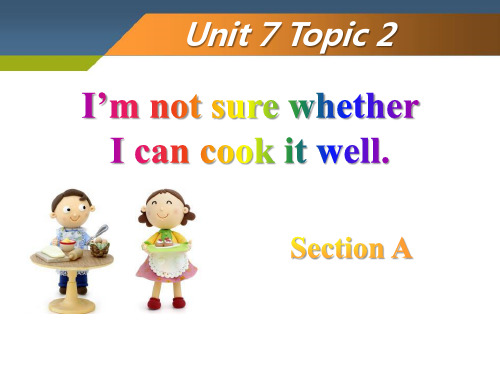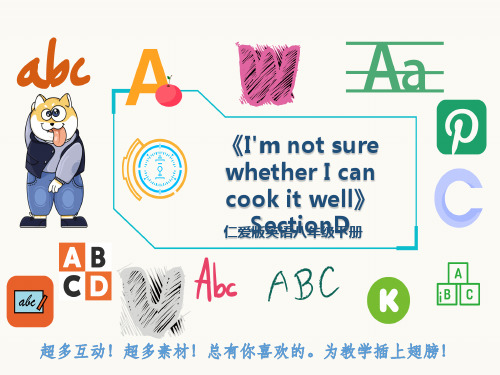《I'm not sure whether I can cook it well》SectionB PPT[优秀课件资料]
八年级英语下册《Unit 7 Topic 2 I’m not sure whether I can cook it well Section A》学案2

Unit 7 Topic 2 I’m not sure whether I can cook it well SectionATeaching aims:1. Learn some new words and adverbs2. Learn Object Clauses with Whether/if3. Learn how to make foods with first, next….finally一. Learn by yourself:1.make fried rice for our food festival 为我们的美食节做炒饭2.whether3.I’m you.我以你为骄傲。
4. . 你真是太好了。
5.cut—(过去式) 切cut up ;cut A into B ;6.cooked meat7.finely(副词)细地carefully(副词) 细心地lightly(副词) 轻轻地slowly(副词) 慢慢地8.well done 干地好9.put some in the 放些油在锅里10. fry(动词)用油炸----- 油炸的11. add--- (过去式) 添加12.做饭很有趣13.垃圾食品Class exercise一.写出下列单词。
1.油___________2. 盐 ___________3 锅__________4 炒, 煎 _____________5 添加______________ 6炒饭 ________________7 骨头汤_________8碗____________9健康______;健康的(形)____;不健康的(形)____健康地(副)______;二写出下列单词的副词及副词的意思1. fine---_________; ________2.light---________;__________3. slow--- ________; ________4.final----________; _________5. careful---_________; _______ 6 good---_________; ________三.用括号中单词的正确形式填空。
仁爱版英语八年级下册:Unit 7 Topic 2. I'm not sure whether I

Unit 7 Food FestivalTopic 2 I’m not sure whether I can cook it wellSection B【学习目标】:1.谈论Kangkang和同学们为美食节做准备,学习西餐中三明治的做法。
复习运用表达请求和允许的功能用语,进一步学习运用表示顺序的副词的用法、以及由whether/ if引导的宾语从句。
2.初步接触单音节副词的比较级和最高级。
3.了解不同国家不同的餐桌礼仪,引导学生乐于接触和了解外国风俗文化,从而更好地为弘扬中国文化服务。
【学习重难点】:运用表达请求和允许的功能用语,进一步学习运用表示顺序的副词的用法、以及由whether/ if引导的宾语从句。
【学习过程】:第一段:短课导学模块一:自主学习学习内容摘记Step1. Leading & Listening1. Students retell the steps of cooking fried rice, using First… Second…Then… Finally…2. (PPT) First, learn the news : snack , butter, pear, pieceThen , T:Do you know how to make a sandwich with some bread and apear? Now,please watch the flash and finish 1b。
3. 播放视频,学生跟读。
Step2 品读----读出理解。
(自主学习:要求独立、安静完成)一、underline the following phrases and sentences1) 在1a 中,圈出这些表示顺序的副词:First…,Next…,Then…,After that…,Finally…;2) cut…into…把…切成…3) Would you mind if we learn to make it from you? 你介意我们跟你一起学做吗?4) Practice makes perfect. 孰能生巧嘛。
Unit 7 Topic 2 I’m not sure whether I can cook it well Section D教学案仁爱版

Unit 7 Topic 2 I’m not sure whether I can cook it well Section D学习目标:1、熟读短文1,了解并能用英语谈论一些国家的饮食习惯;2、复习归纳whether/if 引导的宾语从句及表示顺序的副词First...,Second...Next...Then...After that...Finally的用法,并能用英语描述如何制作鸡汤。
第一段:【短课导学】模块一:自主学习Thailand, spoon,fork, don't use knives./ /____n whether第二段:【长课导学】模块二:交流研讨的答案及模块三:巩固内化课题:Unit7 Topic2 I’m not sure whether I can cook it well. Section D P 69-70 第4课时授课时间:第9周周姓名模块四:当堂训练老师的话:复杂的事情简单做,简单的事情认真做,认真做的事情重复做,重复做的事情创造性做!一时专一事,做最好的自己,你一定成功!一、用所给词的适当形式填空1. I’m tired of ____________ ( watch ) television. Let’s go out for a walk.2. It’s __________ ( polite ) to make a noise in the library.3. Remember ___________________ (not play ) computer games too often, or you’ll fall behind others in your class.4. It’s not easy to cut unlocked meat ___________ ( fine ).5. What I need is ____________ ( chopstick ), not forks.二、单项选择( ) 1. Do you know ______ or not it is polite to smoke during a meal in France?A. ifB. whetherC. thatD. what( ) 2. I will send an e-mail to him _____ I have time.A. thatB. whatC. whetherD. if( ) 3.—Could you tell me _____ she will come? – Sorry, I _____.A. that; couldn’tB. that; can’tC. whether; couldn’tD. whether; can’t( ) 4. I don’t know _____ it will rai n tomorrow. I am going to the park _____ it doesn’t rain.A. if; ifB. that; ifC. if; whetherD. whether; whether( ) 5.—Do you know ______? – It’s hard to say. But I’m sure he’ll try his best.A. whether he can win the game or not.B. whether can he win the game or not.C. if can he win the game or not.D. if he can win the game or not. ()6.Let’s go camping if it _____ this weekend. --- But nobody knows if it _______.A .is fine , will rain B. will be fine; rains C. will be fine, will rain D. is fine ,rains() 7. The teacher said there ______ seven days in a week.A.isB. areC. wasD. Were三、阅读理解An important question about eating out is who pays for the meal. If a friend of yours asks you to have lunch with him, you may say something like this, “I’m afraid it’ll have to be someplace cheap, as I have very little money.” The other person may say,“OK, I’ll meet you at Mc Donald’s.”This means that the two agree to go Dutch, that is, each person pays for himself. He may also says,“Oh, no, I want to take you to lunch at Smith’s.” This means t he person wants to pay for you. If you feel friendly towards this person, you can go with him and you needn’t pay for the meal.American customs about who pays for dates(约会) are almost the same as in other parts of the world. In the old days, American women wanted men to pay for all the meals. But today, a university girl or a woman in the business world will usually pay her own meal. So as you can see, it is a polite thing to make the question clear at the very beginning.根据短文内容,完成下列各题。
【推荐】八年级英语下册Unit7Topic2I’mnotsurewhetherIcancookitwell讲义新版仁爱版.doc

Unit 7 Topic 2一、重点单词(所有程度学生都要掌握)fine(adj)--finely(adv)light(adj)--lightly(adv)healthy(adj)--health(n) noisy(adj)--noisily(adv)quiet(adj)--quietly(adv) polite(adv)--politely(adv)add(v)--added(过去式)dish(n)--dishes(复数)south(n)--southern(adj)二、词组(△的程度较差可以不掌握,中、上学生需全部掌握)Section A1. make fried rice / a sandwich 做炒饭/三明治2. cook noodles / chicken soup 煮面条/鸡汤3. be proud of 为…感到自豪4.△ cooked meat / boiled water / broken glass / fried chicken熟肉/开水/碎玻璃杯/炸鸡5. try to help others 试图去帮助他人6. add sth to sth 把某物加进某物7. cut it / them up 把它(们)切碎8.cut….into pieces 把…切成片9.fry…for a few minutes 把…炒几分钟10. make bone soup 熬骨汤11. boil some water 烧些开水12.△cook noodles for 3-5 minutes 把面条煮3到5分钟13.△fill the bowl 70%-80% full with bone soup 在碗里装满七八成的骨头汤Section B14.two pieces of bread 两片面包a piece of 后面常跟不可数名词一片/张/块/条/则…,a piece of paper 一张纸a piece of glass 一块玻璃a piece of music 一首音乐a piece of advice 一条建议15.put butter on the bread 涂抹黄油在面包上16.put some honey over the pear 倒一些蜂蜜在梨上17.prepare for sth. 为……做准备18.eat with your arms or elbows on the table 吃饭时将手和手肘放在桌上e a spoon and a fork to eat 使用汤匙和叉子来吃20.a knife and fork 一副刀叉Section C21.a formal western dinner party 一场正式的西餐宴会22.for the first time …第一次23.had better ( not ) do sth 最好(不)做某事24.table manners 餐桌礼仪25.sit down / have a seat / take a seat 就坐26.at the table 在桌旁27.at table 就餐28.start / begin with…以…开始29.eat it / them up 吃光30.know about/ follow western table manners 了解/遵守西方的餐桌礼仪31.keep the fork in your left hand 左手拿叉32.speak loudly 大声的说话33.drink to sb./sth. 为某人/某事干杯34.take a little 喝一小口35.remember not to drink too much 记得不要喝太多38.remember / forget (not) to do sth 记得/忘记去做某事39.remember / forget doing sth 记得/忘记做过某事40.drink too much 喝太多41.too much water (不可数名词) 太多的水42.too many pens (可数名词) 太多的笔43.much too tired / fast (形容词/副词)太累/快44.do as other people do 跟着别人做45.point at people with chopsticks 用筷子指人46.a pair of chopsticks 一副筷子47.eat with their left hands 用左手吃48.finish doing sth. 完成做某事Section D49.people around the world 世界各地的人们50.have different eating habits 拥有不同的饮食习惯51.two or more courses 两道或更多的菜52.in the southern part of China 在中国的南部53.be far away from 远离某地54.in the central and western parts 在中部和西部地区55.pick up the food 抓取食物56.pick it / them up 把它(们)捡起来57.at the same time 同时58.your favorite Chinese food 你最喜爱的中国食物三、重点句子(所有程度学生都要掌握)Section A1. Well done! / Wonderful! / Great! / Perfect!/ Excellent!/ Keep trying!干得好!2. I’m glad that you are trying to help others. 我很高兴你试图帮助他人。
新版仁爱英语初二下册unit7Topic2知识点归纳

新版仁爱英语初二下册unit7Topic2知识点归纳I`m not sure whether I can cook it well.重点句型。
Section ABut I’m not sure whether I can cook it well. 但我不确定是否能把它做好。
这是一个whether 引导的宾语从句,whether 在这里可以和if 互换。
但当whether 引导的从句后有引导的从句后有or not ,此时就不能和if 连用。
e.g. I don’t know whether he will come or not. 我不知道他会不会来。
I’m glad that you are trying to help others. 我很高兴你尽力去帮助别人。
1 )be glad (adj.) + that( 宾语从句) 高兴……;e.g. I’m glad that you will come. 我很高兴你能来。
类似的句型还有be+afraid(adj.) + that( 宾语从句) 恐怕……;be sure(adj.) + that( 宾语从句) 确保……。
2 )help others 帮助别人;3 )try to do sth. 尝试做某事;e.g. I try to lose some weight. 我试着减肥。
Would you like me to help you? 你需要我的帮忙吗?该句表示“客气的请求”,相当于Would you like + to do…?或Wil l you please + do…?另外,would like sb. to do sth., 这里would like 是动词,相当于wa nt, 译为“想要某人做某事”。
e.g. Would you like something to drink? 你要不要来点喝的?It’s very kind of you. 你真好。
《I'm-not-sure-whether-I-can-cook-it-well》SectionC-

food on your plate? 4. I’m not sure. Is he at home? 5. I want to know. Will it rain tomorrow?
1. Some new words:
n.手指
Write a short passage about table manners in China, using object clauses and the information you have collected in 1c.
把下列句子合并成一个含有宾语从句的复合句。
1. I don’t know. Is she a teacher? 2. Do you know? Is it good to watch TV
2024/3/17
First,talk with your partner about western table manners.
When you sit down at the table, ... The dinner always starts with … You should keep the fork ... If you use your knife, ... Don’t take … Don’t speak … When you drink to someone, you 'd better...
3.Object clauses with if/whether:
Can you tell me if it's polite to eat with your arms or elbows on the table in America?
《I'm not sure whether I can cook it well》SectionA

Food:
Ingredient: …
Step: First, … Next, … Then, … After that, ... Finally, …
单项选择。
( B)1. Cook noodles for 3-5 minutes in ___ pot.
A. other B. another
C. others D. the other
3b Work in pairs and talk with your partner about the fast food in China.
You may begin like this: A:What do you think of the food in McDonald's or KFC? B:I like the food in KFC very much because.../I don't like to eat in McDonald's because...
First,_c_u_t_some cooked meat very finely. _N_e_x__t_, put some oil in the pan.
Then,fry the meat lightly. After that, add the rice slowly.
_F_i_n_a_l_l_y_,add some __sa__lt__.
1.Know the ways to cook porridge , fried rice and noodles.
2.Talk about sequence:
First … Second … Next … Then … After that … Finally …
《I'm not sure whether I can cook it well》SectionB PPT【优秀英语课件】

earlier than he.But he does his homework better than I. ...
4a Read the pairs of words aloud,paying attention to the sounds of the underlined letters.Then listen and try to imitate.
1. Some new words: snack,butter,pear,piece,slurp,impolite,noisily,polite
2.The comparative and superlative degrees of monosyllabic adverbs:
You did quite well. But I think you did better than I. Michael did best of all.
Unit 7 Topic 2
Who can tell me how to cook porridge/fried rice/noodles ?
I can tell you how to cook ... First, … Next, … Then, … After that, ... Finally, …
When you describe more than one step,you often use rising tone for such words as first,second before you come to the end.
A:Would you like to tell me how to cook the meal? B:Sure.What do you want to learn? A:Could you teach me how to make fried rice? B:Yes,it's easy.First,cut some cooked meat very finely.Next,put some oil in the pan.Then fry the meat lightly.After that,add the rice slowly and fry it for a few minutes.Finally,add some salt. A:Yeah! Cooking is fun!
Unit7 t2 I’m not sure whether I can cook it well教案

Unit7 Topic2 Section C 教学设计一、教学分析:在讲这节课之前,我对全单元的内容进行了综合分析和整合。
八年级第七单元的教学内容主要围绕饮食的话题而展开,融入了功能项目里社会交往中“邀请(Invitation)、”“打电话(Making telephone calls)”和“就餐(Having meals)”等功能目标语言;学生在学习知识的同时,学会关心帮助别人;在了解中国饮食文化的基础上,了解不同国家的不同饮食习俗。
本单元的第二话题是本书的主人公Kangkang他们切实为美食节做准备。
Kangkang跟妈妈学做米饭,引出中餐饺子和面条的制作过程和方法,接着又推出西餐中三明治和汉堡包的做法,自然引出如何进食西餐,接下来具体介绍日本、美国、印度、泰国、法国等国家的饮食习惯及餐桌礼仪等,比较中西方饮食方面的差异,为下一个话题“国际美食节”的召开做准备。
二、教学设计思路Unit7 Topic2 SectionC 主要介绍了西餐餐桌礼仪,通过本课教学,让学生在学习中了解并感受西餐礼仪文化,并在讨论不同国家饮食习俗中继续学习宾语从句。
结合学生的生活经历或者帮助学生通过阅读来了解和感受西餐礼仪文化。
利用视频、图片等丰富教学手段,帮助学生记忆。
三、教学目标和要求:1.学习西餐的餐桌礼仪Learn the table manners for a formal western dinner.2.继续学习宾语从句Continue to learn the object clause.(一)知识1.掌握有关西餐的餐桌礼仪的词: manner, table manners, lap, eat up, drink to sb/sth..; formal, napkin,2.掌握宾语从句的表达I want to know whether/if it is impolite to smoke during a meal in France.3.以西餐礼仪为话题,应用以下句子:Take your napkin and put it on your napkin.When you start eating, you should keep the fork in your right hand.If you use your knife, then put the fork in your left hand.It’s polite to eat up the food on your plate, so don’t take more food than you need.You should speak quietly and smile a lot.When you drink to somebody, you’d b etter raise your glass and take only a little. Remember not to drink too much.(二)能力与情感学生能比较东西方餐桌礼仪的不同,从而达到尊重差异。
八年级英语下册Unit7l2I’mnotsurewhetherIcancookitwellS教案

Unit 7 Topic 2 Section A授课时段:第周星期课型Saying and listening教学目标1.Knowledge aims:(1)学习并掌握新词汇add, fry, cut up, oil, pork, ham, onion, noodle, ingredient, pan, pot, cooker, bowl,finely, lightly,(2)学习 whether/ if 引导的宾语从句。
(3)学习表示顺序的副词的用法。
(4)掌握副词修饰动词的用法及部分形容词+ly变成副词的构词法。
2. Skill aims:(1)能听懂有关食物制作的话题的对话,识别主题,并获取主要信息。
(2)能使用英语陈述食物的制作过程。
(3)能理解所给语言材料中事件的发生顺序和人物行为。
3. Emotional aims:把课本上学到的知识运用于实际生活中。
培养生活技能,比如做饭。
重点难点1. Key points:(1)学习 whether/ if 引导的宾语从句。
(2)学习表示顺序的副词的用法。
(3)掌握副词修饰动词的用法及部分形容词+ly变成副词的构词法。
2. Difficult points:使用英语陈述食物的制作过程。
教学过程集体备课个人备课Stag 1 . ReviewGreet the students and get them ready for learning. Play the taperecording of the song Sovereign Light Café.Stag 2 . Pre-listening1. Show the poster of the food festival a nd review the names of foods in different countries.Let Ss review the names of foods i n different countries.Italian pizza , American chocolate cookies, Greek cheese pies, Indian curries …2. Show some pictures to learn the new words. Ast Ss to look at the pictures and learn the new words: oil, port, ham,onion, ingredient, pot, pan, bowl, cooker, fry, fried rice.T: Did you notice that when you want to express steps, it’s helpful to use some adverbs such as first, second, next, then, after that and finally. I hope you can use these adverbs in your talking and compositions.Stag 3 . While-listening1. Ask Ss to listen to 1a and answer the question: What ingredients does Kangkang need to cook fried rice?2. Ask Ss to listen to 1a again and complete the steps of cooking fried rice in 1b.3. Check the answers. Who can read the steps?Stag 4 . Post-listening1. Let the Ss Read 1a again to find the object clauses and try to learn the use of adverb .2.A st Ss to find all the adverbs in this conversation and get to know how they are used. Then draw a conclusion careful+ly→carefully cook … carefullyfine+ly→finely cut … finelylight+ly→lightly fry … lightlyslow+ly→slowly add … slowlyStep 5 SummaryShow summary on the screen.Step 6 Exercises :1. Many parents dislike their children eating pizzas and hamburgers because_____________.they are too quick B. they are expen siveC. t hey think they are unhealthy2.Junk foods are_____________.A. foods that taste goodB. foods that have much oilC. foods that are not good for health3.What can we put on a pizz a or a hamburger to make them healthier? _____A. VegetablesB. Much oilC. Much meat4.What's the main idea of the passage? _______A. Children like pizzas and hamburgers.B. Pizzas and hamburgers are junk food.C. We should eat pizzas and hamburgers healthily.Step 7 Homework1.背诵1a .2.完成练习册section A个人教学反思。
仁爱版英语八年级下册《I'm not sure whether I can cook it well

3 Look at the pictures and write a passage about how to cook chicken soup.
cut up wash
put...into
boil
add salt, green onions
ready, enjoy
Example:
Chicken soup is very delicious, and it’s good for our health. Would you like to eat some chicken soup? Well, let’s cook it together.
Talk about eating habits in different parts of the world according to 1.
Example: A: Can you tell me if there are two or more courses for every meal in North America, Australia and Europe? B: Yes, I think so. A: Do you know if people in the south of China often eat noodles? B: No, I don’t think so. But sometimes they do.
2. ...,there are two or more courses for every meal and people use
knives and forks to eat. ......,每顿饭有两道或两道以上的主菜,人们用刀叉吃饭。 course 可数名词,意为“一道菜”。 E.g:主菜是烤鸭。The main course is the roast duck.
《I'm-not-sure-whether-I-can-cook-it-well》SectionB-

1. Some new words: snack,butter,pear,piece,slurp,impolite,noisily,polite
2.The comparative and superlative degrees of monosyllabic adverbs:
You did quite well. But I think you did better than I. Michael did best of all.
polite in Japan.
( 2 ) OK. Mm, it's delicious. (Slurp!) ( 8 ) Not bad,Maria. ( 3 ) Kumiko,is it too hot? ( 1 ) Come on,Kumiko!Help yourself to some soup. ( 4 ) No.Why? ( 6 ) Oh.In Japan,it's polite to do that.It means you like the food
C. to put
( A ) 5. ---Would you mind if I learn English from you?
---__________. I am very glad to teach you.
A. Of course not. B. You’d better not. C. Sounds great.
1.Would you mind if we learn to make it from you ? 我们向你学习做它(三明治)好吗?
(1)Would you mind if...请求允许或客气地请某人做某事。 E.g:我打开窗户好吗?
2023年仁爱版八年级英语下册Unit7 Topic 2 I’m not sure whether

Unit7 Topic 2 I’m not sure whether I can cook it wellSection C导学案一、学习目标:1.学习新单词和短语。
2.继续学习宾语从句。
二、学习重点(合作探究):1.继续学习宾语从句。
2.学习西餐的餐桌礼仪。
三、学习过程:I预习自测:1.时间顺序的副词:first—then—next—after that—finally(首先,然后,接下来,再之后,最后)2.two pieces of bread _________3.spread sth.on/ over 往……上涂抹…….4.put sth together 把…….放在一起5.pour sth over 往……倒…..6.learn sth. from…从…….学到……7.Follow me, please. 请跟我学8.be ready准备好e on 过来10.Help yourself (yourselves) to ….自用……. II解难答疑:11.It’s polite / impolite to do sth.做某事有礼貌/ 没礼貌12.Not bad. _________13.eat with on e’s arms or elbows on the table跋在桌子上吃饭14.for the first time _______15.western table manners 西方的就餐礼仪16.table manners_________17.si t down at the table 准备就餐18.sit down at table 就餐19.at the table 在桌旁at table 在就餐20.finish doing sth 完成做某事21.on the plate _______22.drink to .为某人的(健康、成功、幸福)干杯23.take a sip 喝一小口24.remember to do sth. 记住去做某事25.remember doing sth. 记住做过某事26.too much+不可数名词27.too many+可数名词太多….e sth. for…..用……来做……29.much too+ 形容词太……30.have different eating habits_______III反馈拓展:选用if 或whether填空。
- 1、下载文档前请自行甄别文档内容的完整性,平台不提供额外的编辑、内容补充、找答案等附加服务。
- 2、"仅部分预览"的文档,不可在线预览部分如存在完整性等问题,可反馈申请退款(可完整预览的文档不适用该条件!)。
- 3、如文档侵犯您的权益,请联系客服反馈,我们会尽快为您处理(人工客服工作时间:9:00-18:30)。
1.Would you mind if we learn to make it from you ? 我们向你学习做它(三明治)好吗?
(1)Would you mind if...请求允许或客气地请某人做某事。 E.g:我打开窗户好吗?
Would you mind if I open the window? (2)learn to do sth.from sb. 向某人学习做某事
E.g:他向他父亲学习下棋。
He learns to play chess from his father. 2. ...,you did quite well.你做得非常好。
But I think you did better than I.但是我认为你做得比我更好。 Michael did best of all.迈克尔是所有人中做得最好的。 这三个句子中的well,better,best都是副词,作动词did的状语。 better,best分别是well的比较级和最高级形式。
Michael cooks Kangkang cooks Jane cooks
well. better. best.
Michael stays Kangkang stays Jane stays
long. longer. longest.
1b
Favorite snack:_a__sa_n_d_w__ic_h____
1.Make a sandwich or a hamburger. 2.Read 1a and try to retell it. 3.Finish Section B in 当你的才华还撑不起你的野心时,你就该努力。心有猛虎,细嗅蔷薇。我TM竟然以为我竭尽全力了。能力是练出来的,潜能是逼出来的,习惯是养成的,我的 成功是一步步走出来的。不要因为希望去坚持,要坚持的看到希望。最怕自己平庸碌碌还安慰自己平凡可贵。
3.Object clauses with if/whether: I don't know if it is polite in Japan.
1.Ask for permission: Would you mind if we learn to make it from you? 2.Make sandwich step by step.
Example: Wang Gang and I are good friends.I go to school
earlier than he.But he does his homework better than I. ...
4a Read the pairs of words aloud,paying attention to the sounds of the underlined letters.Then listen and try to imitate.
Unit 7 Topic 2
Who can tell me how to cook porridge/fried rice/noodles ?
I can tell you how to cook ... First, … Next, … Then, … After that, ... Finally, …
C. to put
( A ) 5. ---Would you mind if I learn English from you?
---__________. I am very glad to teach you.
A. Of course not. B. You’d better not. C. Sounds great.
在日本,大声地喝汤是礼貌的。
3 Listen and number the sentences to form a conversation.Then practice with your partner.
( 7 ) OK,let me try.(Slurp!) ( 5 ) Well,in Cuba,it's impolite to eat so noisily.I don't know if it is
单项选择。
( C ) 1. I don’t know ____ he is right .
A. that B. what C. if
( C ) 2. Which one goes ____, the car, the train or the plane?
A. fast
B. faster
C. fastest
3. I don’t know if/whether you are right.
Compare the following things with your friends, then make a report after the example.
go to school/do one's homework/play basketball/run/cook/... (early/well/fast...)
polite in Japan.
( 2 ) OK. Mm, it's delicious. (Slurp!) ( 8 ) Not bad,Maria. ( 3 ) Kumiko,is it too hot? ( 1 ) Come on,Kumiko!Help yourself to some soup. ( 4 ) No.Why? ( 6 ) Oh.In Japan,it's polite to do that.It means you like the food
Ingredients:1.bread 2.___b_u_t_te_r__ 3. pear
4.__h_o_n_e_y____
Process: _F_i_rs_t__,take two pieces of bread and put some butter on them.
Next, cut a pear into small pieces __c_a_re_f_u_ll_y__.
◆Understand the following sentences:
1. I don’t know if/whether I need to obey all the rules while I’m having dinner with my friends.
2. Could you tell me if/whether it’s polite to speak loudly at the table?
When you describe more than one step,you often use rising tone for such words as first,second before you come to the end.
A:Would you like to tell me how to cook the meal? B:Sure.What do you want to learn? A:Could you teach me how to make fried rice? B:Yes,it's easy.First,cut some cooked meat very finely.Next,put some oil in the pan.Then fry the meat lightly.After that,add the rice slowly and fry it for a few minutes.Finally,add some salt. A:Yeah! Cooking is fun!
( B ) 3. I would like a sandwich_______ honey.
A. for
B. with
C. of
( C ) 4. It's polite______ up your hand before answering the
questions.
A. put
B. putting
1c Read 1a and retell the process of making a sandwich, using first, next, then...based on 1b.
polite
impolite
adj.有礼貌的,有教养的 adj. 不礼貌的, 粗鲁的
noisily
adv. 喧闹地 E.g.:In Japan, it's polite to eat soup noisily.
a piece of bread butter
n. 黄油
n.一块(片、张、件......)
pear
n. 梨
n.小吃
Do you know how to make a sandwich with some bread and a pear?
First, take two pieces of bread and spread butter on them. Next, cut a pear into small pieces carefully. Then put them on the bread lightly. After that, put some honey over the pear slowly. Finally, put the pieces of bread together.
__T_h_e_n_, put them on the bread _li_g_h_tl_y_____.
After that, put some honey over pear __s_lo_w__ly____.
_F_in_a_l_ly_,put the pieces of bread together.
1. Some new words: snack,butter,pear,piece,slurp,impolite,noisily,polite
